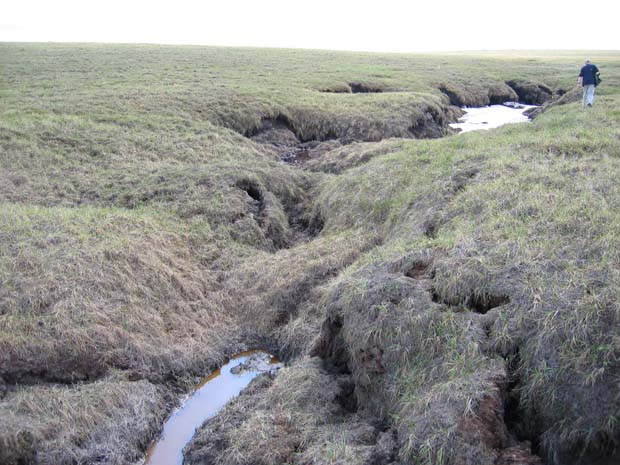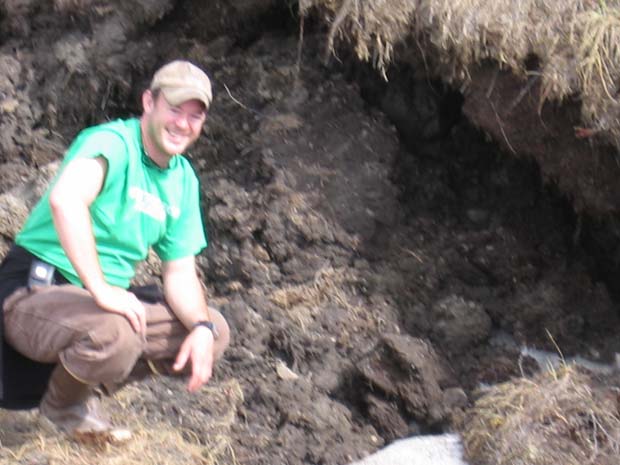( Log In ) Log In is for TREC Teachers & Researchers only
  |
| Tom_Crumrine |
 Jun 17 2005, 02:05 AM Jun 17 2005, 02:05 AM
Post
#1
|
 TREC Teacher    Group: TREC Team Posts: 188 Joined: 27-April 05 Member No.: 9 |
16 June 2005
Today was a big day. My brain is swelling. I don’t know that I’ll be able to remember everything but it was great to learn so much about what happens at Toolik. A group of evolutionary biologists were in camp so Donie gave a talk on what happens here and gave them a tour of the research plots. Her talk was very good and just like all of the papers I have been reading all of the evidence points to warming and climate change. She mentioned that they have found mainly positive feedback loops in their research. Meaning that one problem makes other problems and so on. An example of this is the sea ice. Sea ice reflects heat and water absorbs (that’s the simple version). As temperatures warm, sea ice decreases. As sea ice decreases more water is exposed—and so on. An experiment that was started over 20 years ago gives an example of this positive feedback.  Originally the researchers that Donie works with though that as temperatures warmed maybe as plants grew taller they would absorb more carbon from the atmosphere. That is, they were looking for a possible negative feedback loop—something that would slow the increase of carbon to the atmosphere. As you can easily see the plants certainly got bigger with greenhouses over them. What happened though was that the soil under the plants began to loose carbon. Exactly why, is part of what is being worked on now but they saw that once again there was another positive feedback when it came to carbon. In the afternoon we drove about 10 miles north of the Toolik Camp to look at a thermokarst. This is what happens when underground permafrost melts. Since ice takes up more space than water the melting allows more space for water to flow. This allows water to flow and eventually you get this...  For a little scale I got down in  Several things happen as a result of this. Nutrients are depleted from the area as the water washes them away. Lots of erosion occurs. This erosion allows nutrients, soil, etc. to flow into rivers. This thermokarst is flowing until it reaches the Toolik river which flows to the Toolik Lake. Also, scientists last year placed flags where the edge of the thermokarst was and it is much, much bigger this year. Some of the flags weren’t there when they returned as such large pieces of tundra had fallen. The thing about all of these changes is that they are happening fast. Yes, changes like this may have occurred in the past but not over such a short amount of time. Those who still need convincing would do well to come to an area like this. Since the arctic shows changes so much more quickly than other areas it is an ideal place to see what all of this climate change is really doing.  I included this last picture because it shows the juxtaposition of the oil pipeline and what I would say is a moderately nice background. I've been meaning to for a couple of days but tomorrow I promise to tell a little more about the oil pipeline. |
| Robert_Oddo |
 Jun 19 2005, 02:45 PM Jun 19 2005, 02:45 PM
Post
#2
|
 TREC Teacher    Group: TREC Team Posts: 165 Joined: 27-April 05 Member No.: 8 |
Tom,
real interesting stuff. I read in one of the texts that as the tundra starts to melt many are worried about the release of methane hydrate. Has anyone talked about that? Bob |
  |
1 User(s) are reading this topic (1 Guests and 0 Anonymous Users)
0 Members:

|
NSF Acknowledgment & Disclaimer | Time is now: 4th November 2024 - 05:58 PM |
Invision Power Board
v2.1.7 © 2024 IPS, Inc.








